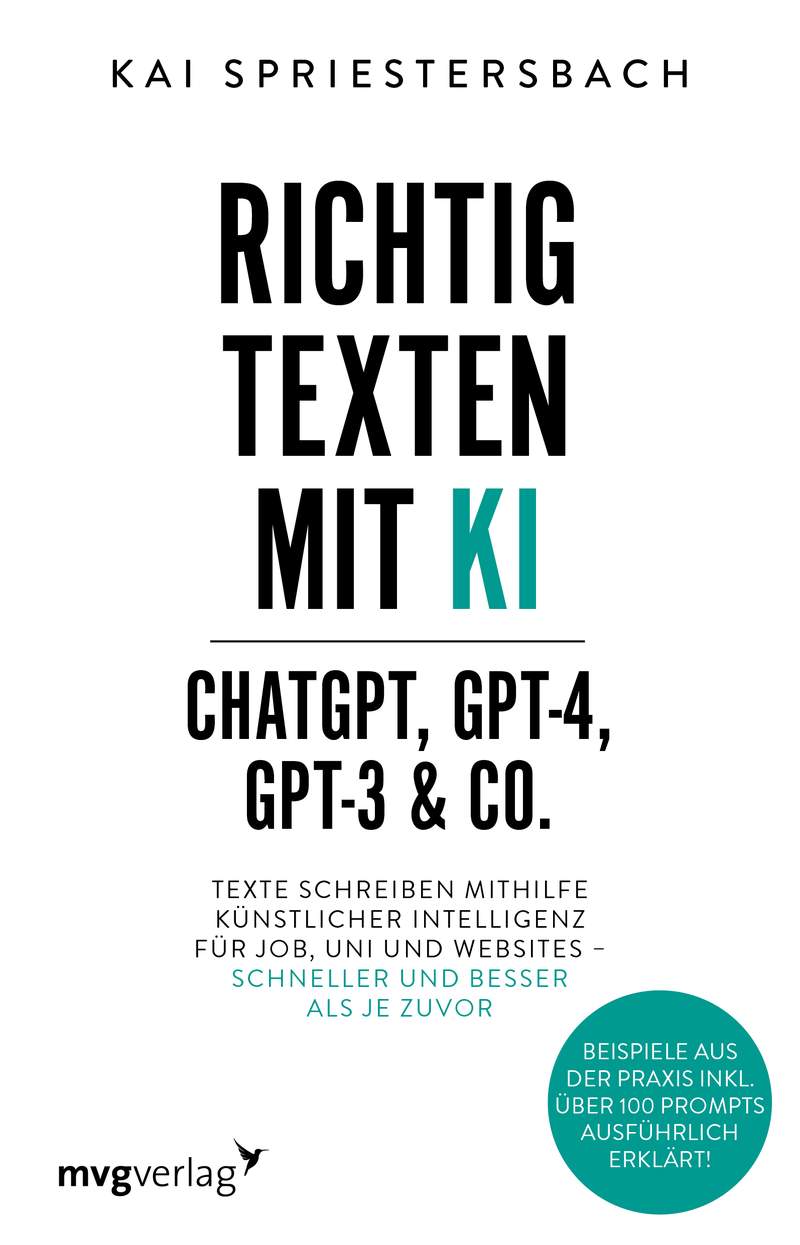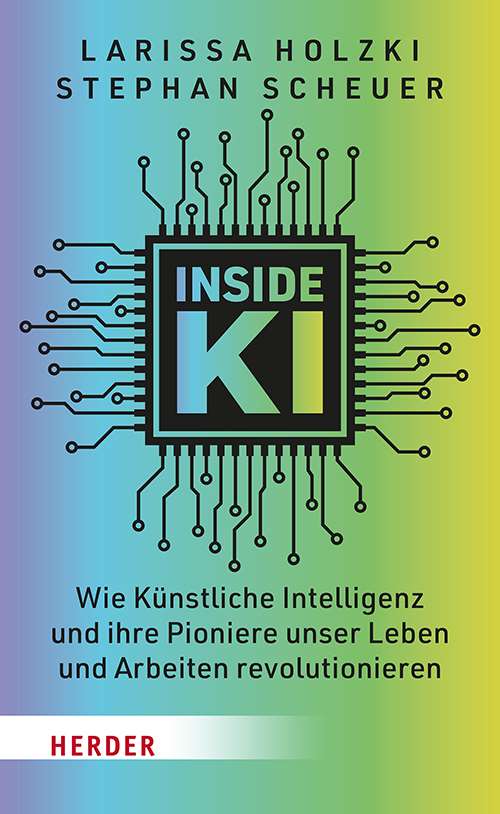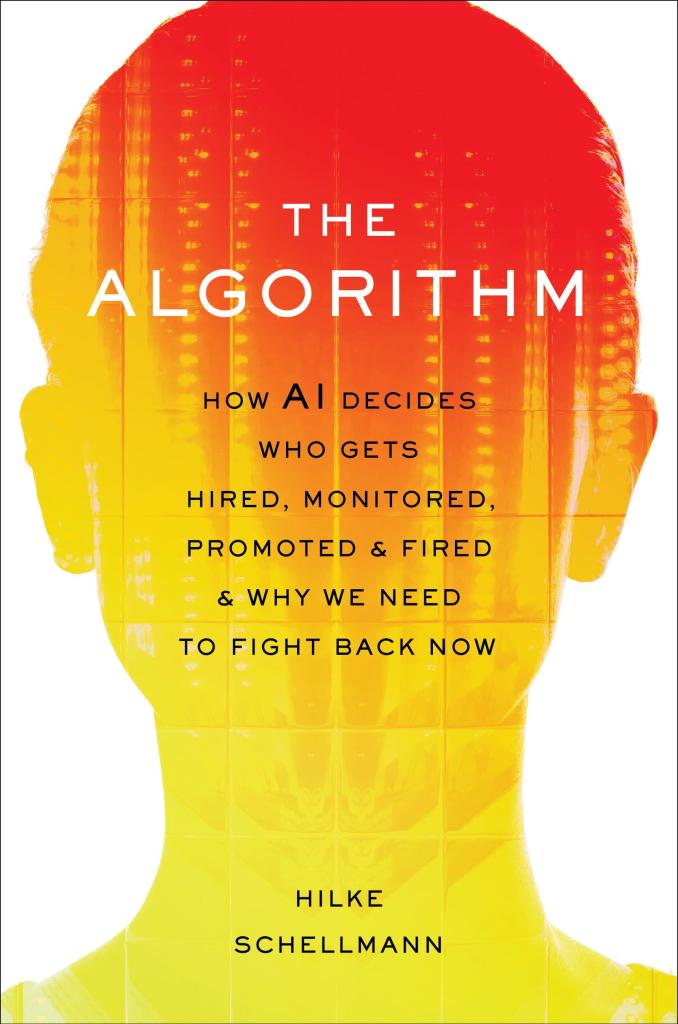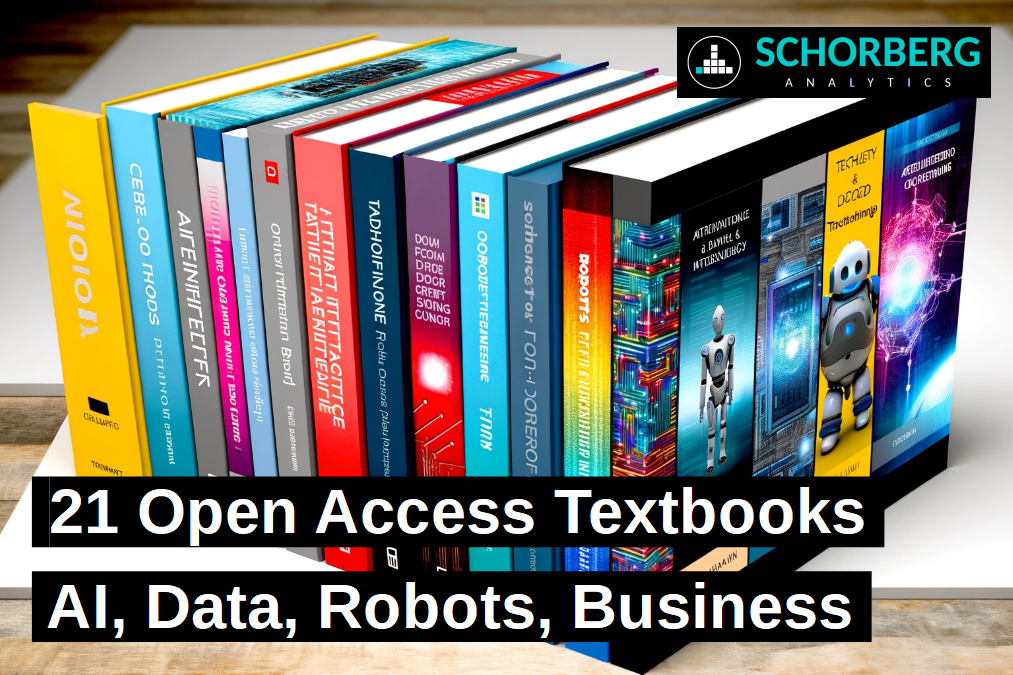Updated, 20/03/2024: Book list with 20 more books on AI at the end; some text extensions and corrections.
Dear visitor!
We live in fast times, information travels with light speed around the globe, and artificial intelligence is not breaking the law anymore with the AI Act that just passed the EU parliament on March 13, 2024.
To put it casually, alluding to a song by a well-known British hard rock band. Which I remembered recently while watching an TV interview on German/Austrian/Swiss culture channel 3sat with the front man of the group. (Can you guess who it was?)
Update 02/04/2024 (d:m:y): I published the solution for the little riddle today in this newsblog article and last week on this LinkedIn post.
The Artificial Intelligence Act
But I don’t want to write today about the Artificial Intelligence Act as a European Union regulation yet (nor about Heavy Metal music), but about what’s in the first part of this newsblog’s title: 7 Books on AI for Work and HRM (five published in 2024 and two in 2023; one in English).
However, anyone who works professionally with these mathematical-computer-based tools should take a close look on this new and unique law on AI and its key content: the five level of risk from artificial intelligence. You can find more on the AI Act in this article by Deutschlandfunk (in German, March 16) and on this special EU website.
For HR leaders and professionals it is crucial to know and act on that AI applications for employment like CV-scanning, worker management, vocational training, and the like are classified as “high risk” by the AI Act – as others areas like health or law where AI systems negatively affect safety or fundamental rights of people.
Important to know: The law is expected to come into force with certain delays depending on the risk level in May 2024 after its publication in EU’s own journal.
Note: There is standard for HR Tech in Germany already since 2021: Guidelines and further publications like the “Ethik Check KI” (February 2024) regarding the application of technology and artificial intelligence in HRM were developed by the “Ethikbeirat HR Tech” (Ethics Council HR Tech).
So much for that! Keep in mind this law and guidelines, but let’s us now turn to some more practice and input on how to use AI in your work and for a better HR – and how AI is challenging us and what we else we can do about it.
One more thing: As I am also a fan of science-fiction and thrillers, I added a new novel concerning this areas too. Although such books (and films) can be misleading and they exaggerate in terms of technical, psychological, logical, and other issues more or less (but this is of course one main reason to read fiction at all), some also inspire scientists and engineers, thus drive progress and help to design the future. Good examples are the books by Jules Verne, the novels by Isaac Asimov, or the technical devices designed for Star Trek.
Notes:
(a) As you will see, all but one books of my list are in German. You can find good books on AI and AI in human resources management in English language of course, and a search at O’Reilly or Amazon will help.
(b) And: The first three books presented below are, by accident (no commission for me!) published by renowned Rheinwerk Verlag (formerly: Galileo Press), specialized in IT, Marketing, Photo, and Video. Because of their Eastern sale you will receive until March 24, 2024, a print book and an ebook for one price in a bundle!
But let’s start with the serious books (I will write a separate newsblog article on AI in novels and films):
Eigene KI-Anwendungen programmieren

Metin Karatas (2024). Eigene KI-Anwendungen programmieren. Bonn: Rheinwerk. [February 2024]
https://www.rheinwerk-verlag.de/eigene-ki-anwendungen-programmieren/ [Note: English language edition in preparation an on sale in November 2024 according to this publisher’s website]
KI für Kreative

Jenny Habermehl (2024). KI für Kreativ: Künstliche Intelligenz für Grafik und Design nutzen. Bonn: Rheinwerk. [March 2024]
https://www.rheinwerk-verlag.de/ki-fuer-kreative-kuenstliche-intelligenz-fuer-grafik-und-design/
ChatGPT & Co.

Rainer Hattenhauer (2024). ChatGPT & Co.: Wie du KI richtig nutzt – schreiben, recherchieren, Bilder erstellen, programmieren. Bonn: Rheinwerk. [November 2023]
https://www.rheinwerk-verlag.de/chatgpt-und-co-wie-du-ki-richtig-nutzt/
Richtig texten mit KI

Kai Spriestersbach (2023). Richtig texten mit KI – ChatGPT, GPT-4, GPT-3 & Co. München: mvg. [May 2023]
https://www.m-vg.de/mvg/shop/article/24370-richtig-texten-mit-ki-chatgpt-gpt-4-gpt-3-co/
Inside KI

Larissa Holzki, Stephan Scheuer (2024). Inside KI: Wie Künstliche Intelligenz und ihre Pioniere unser Leben und Arbeiten revolutionieren. Freiburg im Breisgau: Herder. [March 2024]
https://www.herder.de/geschichte-politik/shop/p4/83599-inside-ki-klappenbroschur/
The Algorithm

Hilke Schellmann (2024). The algorithm: How AI decides who gets hired, monitored, promoted, and fired and why we need to fight back now. New York: Hachette Books. [January 2024]
https://www.hilkeschellmann.com
https://www.hachettebookgroup.com/titles/hilke-schellmann/the-algorithm/9780306827341/
Die Burg

Ursula Poznanski (2024). Die Burg. München: Knauer. [February 2024]
https://www.droemer-knaur.de/buch/ursula-poznanski-die-burg-9783426448373
See my note in the following block on this novel and further links regarding the discussion about the risks of AI.
Note: Novel “Die Burg”
This novel deals with an AI that becomes (super) intelligent, forms it own goals, and acts on these. The risks and chances of AI are widely discussed, one result being the AI Act by the EU mentioned at the beginning of my newsblog article. Whether AI will eventually become human-like or even reaches superpowers, is not clear and the positions of leading AI experts are split. Read more on risks and harms in the Wikipedia here and about existential risks from AI here.
The books by Ursula Poznanski and Hilke Schellmann show AI in a negative light or are critical towards the application of AI in HRM. I don’t share such negative views who overdraw what AI will be capable in the near future or which emphasize the risks much more rather than weight the chances equally.
But it is always good to see the other side and be aware of what some people and employees positions are – and address them appropriately for seeking acceptance by making clear that HR decisions are made by humans and that AI follows rules.
What is need here is far more AI competence and data literacy and their promotions are also part of the AI Act, as well as in projects like those that are announced these days by Microsoft Deutschland within the scope of their planned third server location (next to Bedburg and Bergheim) for AI and cloud computing in the state of Nordrhein-Westfalen. See the next block for more.
Note: Microsoft‘s Investment in Germany
Marianne Janik, CEO of Microsoft Germany, says to the press on her visit to an event in the region with politicians on March 18, 2024: “Niemand wird einer Technologie vertrauen, wenn die Beurteilungsfähigkeit dafür nicht da ist.” [No one will trust a technology if the ability to assess it is not there.] Read more in this newspaper article here and here for the companies huge education campaign for AI, and what the involved local politicians think about it.
That was it! I hope you have gotten some suggestions for books that will help you with your professional AI journey. There are of course many other books out there on AI with or without mathematics, on specific areas (like HRM), or on today’s dominating fields: machine learning and deep learning – or short: data science.
What is your favorite book on AI for work? Which one would you recommend to your colleagues? And how do you see our AI future? Please comment on my LinkedIn post regarding this newsblog article.
I wish you a good week, and: Happy reading and applying AI!
Stefan Klemens
Update (20/03/2024): I expanded my list on a number of books on AI, ChatGPT, Business, and Large Language Models (LLMs). See the results in the following block. And I did some text extensions and corrections as well.
Update: 20 more books on Artificial Intelligence (AI), ChatGPT, Business, and Large Language Models (LLMs)
1. Alexander Loth (2024). KI für Content Creation: Texte, Bilder, Audio und Video erstellen mit ChatGPT & Co. Frechen: mitp.
2. Wolfhart Fabarius (2023). ChatGPT in der Unternehmenspraxis: Anwendungsbeispiele für Risikomanagement, Controlling und Compliance. Berlin: Erich Schmidt.
3. Andreas Berens, Carsten Bolk (2023). Content Creation mit KI. Bonn: Rheinwerk.
4. Stephen Wolfram (2023). Das Geheimnis hinter ChatGPT: Wie die KI arbeitet und warum sie funktioniert. Frechen: mitp.
5. Ulrich Engelke, Barbara Engelke (2024). ChatGPT – Mit KI in ein neues Zeitalter: Wie KI-Tools unser Leben und die Gesellschaft verändern. Frechen: mitp.
6. Eric Sarrion (2023). ChatGPT for Beginners: Features, Foundations, and Applications. Berkeley, CA: Apress. [507 pages]
7. Codi Byte (2023). hat GPT Bible: 10 books in 1 : everything you need to know about AI and its applications to improve your life, boost productivity, earn money, advance your career, and develop new skills. Wroclaw: Amazon Fullfilment.
8. Eric Sarrion (2023). Exploring the Power of ChatGPT: Applications, Techniques, and Implications. Berkeley, CA: Apress. [204 pages]
9. Ken Huang, Yang Wang, Feng Zhu, Xi Chen, Chunxiao Xing (Eds.). (2023). Beyond AI: ChatGPT, Web3, and the Business Landscape of Tomorrow. Cham: Springer Nature Switzerland.
10. Tom Taulli (2023). Generative AI: How ChatGPT and Other AI Tools Will Revolutionize Business. Berkeley, CA: Apress.
11. Olivier Caelen, Marie-Alice Blete (2024). Anwendungen mit GPT-4 und ChatGPT entwickeln. O’Reilly.
12. Paul Dupin (2023). Chatgpt: Profitables Geschäft in der Ära der KI Textgenerierung. Epubli.
13. Andreas Helfrich-Schkarbanenko (2023). Mathematik und ChatGPT: Ein Rendezvous am Fuße der technologischen Singularität. Berlin, Heidelberg: Springer Spektrum.
14. Charles Waghmare (2023). Unleashing The Power of ChatGPT: A Real World Business Applications. Berkeley, CA: Apress.
15. Akshay Kulkarni, Adarsha Shivananda, Anoosh Kulkarni, Dilip Gudivada (2023). Applied Generative AI for Beginners: Practical Knowledge on Diffusion Models, ChatGPT, and Other LLMs. Berkeley, CA: Apress.
16. Tom Taulli (2023). ChatGPT and Bard for Business Automation: Achieving AI-Driven Growth. Berkeley, CA: Apress.
17. Michael McTear, Marina Ashurkina (2024). Transforming Conversational AI: Exploring the Power of Large Language Models in Interactive Conversational Agents. Berkeley, CA: Apress.
18. Thimira Amaratunga (2023). Understanding Large Language Models: Learning Their Underlying Concepts and Technologies. Berkeley, CA: Apress.
19. Stefan Brunnhuber (2024). The Third Culture: The Impact of AI on Knowledge, Society and Consciousness in the 21st Century. Cham: Springer Nature Switzerland
20. Stefan H. Vieweg (Ed.). (2023). KI für das Gute: Künstliche Intelligenz und Ethik. Cham: Springer International Publishing, Springer Gabler.
Tip: Still not enough? Need a special book? Looking for upcoming publications? Then please use your favorite book search engine! For my German-speaking readers: buchandel.de shows almost all deliverable books in German language.
Note: Be aware that ChatGPT by OpenAI is although the leading GenAI tool, there are others similar Chatbots (as you probably know) that you should check out and get familiar with by testing them, watching videos and online-tutorials, reading books and articles, and participating in training and workshops:
Note: Major competitors and alternatives for ChatGPT
(a) Gemini by Google (formerly: Bard; see more here) as the most important competitor;
(b) Anthropic (see more here), founded by former members of OpenAI and financed greatly by Amazon and Google;
(c) Chatbots based on the model LLaMA by Meta, now open source.
Get an overview here about Large language models (LLMs) which are the basis for today’s chatbots. Check out also:
(1) French company Mistral AI (more here) with investors like Andreessen Horowitz, BNP Paribas, and Salesforce.
(2) German Aleph Alpha (more here) with investors like Schwarz Gruppe, SAP, Bosch, and Hubert Burda Media.
I will write more on these companies and models in an upcoming newsblog article: So stay tuned and connect with me on LinkedIn!
PS: Want to exchange ideas on Human Resources, people analytics, digital assessment, or artificial intelligence in HRM? Then network, write a message and/or make an appointment for an online meeting. Or the classic way: phone call.
And: You like my work and the content I regularly share? Then I’m happy about a Like or comment on LinkedIn. Thank you! 🙂 🙋♂️🌳


